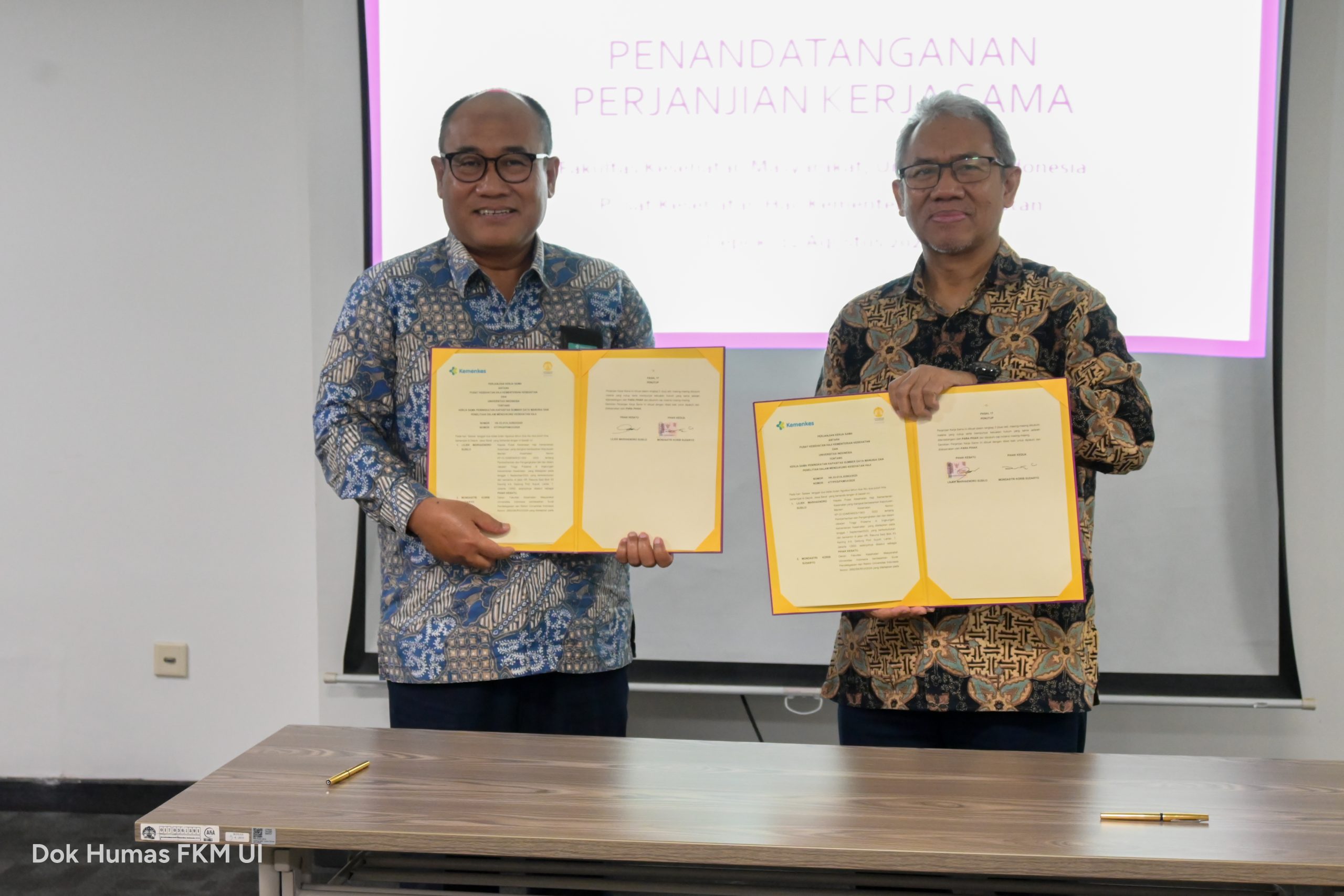Depok, August 12, 2025 — The Faculty of Public Health (FPH) Universitas Indonesia (UI) welcomed a delegation from the Ministry of Health for the signing of a Cooperation Agreement (PKS) with the Hajj Health Center of the Ministry of Health of the Republic of Indonesia. The event, held in Meeting Room PA209, Health Sciences Cluster (RIK) UI, Depok Campus, aimed to strengthen synergy between the academic community and Hajj health practitioners, particularly in the utilization of Hajj pilgrims’ health data, as well as the development of health guidance programs, research, and education.
The event was attended by the leadership of FPH UI, including Dean of FPH UI, Prof. Dr. Mondastri Korib Sudaryo, M.S., D.Sc.; Vice Dean for Education, Research, and Student Affairs, Dr. Ir. Asih Setiarini, M.Sc.; Vice Dean for Resources, Ventures, and General Administration, Dr. Milla Herdayati, S.K.M., M.Si.; Manager for Partnerships, Alumni Relations, and Ventures, Prof. Indri Hapsari Susilowati, S.K.M., M.K.K.K., Ph.D.; as well as heads and secretaries of departments, and program study coordinators. Meanwhile, the delegation from the Hajj Health Center was led by its Head, Liliek Marhaendro Susilo, A.K., M.M., along with his team.
Prof. Dr. Mondastri Korib Sudaryo, M.S., D.Sc., Dean of FPH UI, emphasized in his remarks that the relationship between FPH UI and the Hajj Health Center has long been established on an emotional basis, but is now being formalized to strengthen synergy. “The signing of this Cooperation Agreement marks a good moment for us to resume collaboration and support health programs and policies for pilgrims. We will strive to improve their health, and from the academic perspective, we can analyze the available data to generate impactful and well-targeted policies for society,” said Prof. Mondastri.
Head of the Hajj Health Center, Liliek Marhaendro Susilo, A.K., M.M., elaborated on the complexity of Hajj health issues faced by Indonesia. In 2023, the mortality rate of Indonesian pilgrims reached 773 cases, alongside thousands of illnesses, drawing serious attention from the Saudi government. “After the pandemic, there was a surge of enthusiasm for Hajj departures. However, the health condition of pilgrims, most of whom are elderly, poses a major challenge. Currently, 37% of pilgrims are over 60 years old, and about 80% have comorbidities,” explained Liliek. He added that the Saudi government has now imposed stricter regulations, including limiting the quota for pilgrims over 70 years old to a maximum of 7% and prohibiting those above 90 years old. These regulations have pushed Indonesia to raise the standard of health examinations. According to him, data-driven research is key to formulating appropriate policies, including health feasibility assessments (istitha’ah) and age restrictions.
The signing was carried out by the Dean of FPH UI and the Head of the Hajj Health Center, witnessed by leaders from both institutions. Following the signing, a discussion session was moderated by Prof. Indri Hapsari Susilowati, S.K.M., M.K.K.K., Ph.D., Manager for Partnerships, Alumni Relations, and Ventures. In the session, Dr. Ir. Asih Setiarini, M.Sc., Vice Dean for Education, Research, and Student Affairs, asked whether the health data of approximately 200,000 pilgrims could be accessed for aggregate analysis. This, she stressed, is vital for tailoring policies to regional conditions. Meanwhile, Dr. Milla Herdayati, S.K.M., M.Si., Vice Dean for Resources, Ventures, and General Administration, inquired about the possibility of FPH UI students utilizing this collaboration for activities such as PBL 3 internships.
In response, Liliek explained that ideally, health data should be available two years prior to departure to facilitate health coaching, but always with strict personal data protection. The data will be provided in aggregated and anonymized form. He also confirmed that the Hajj Health Center welcomes student involvement, including in PBL 3, provided it is conducted with supervision and adherence to data protection procedures.
Through this collaboration, FPH UI and the Hajj Health Center aim to establish a strong foundation for research, innovation, and educational programs that directly improve the quality of health services for Indonesian Hajj pilgrims, while reinforcing FPH UI’s contribution to supporting national public health policy. (EAR)

